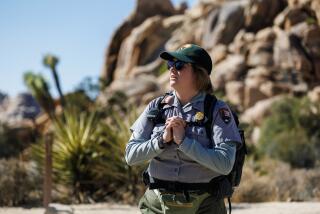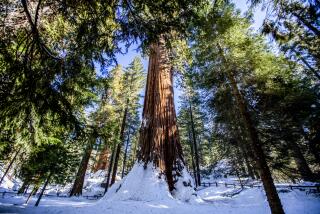Alaska Park Teams Recreation and Wilderness
It was inevitable: Civilization has pierced the wild heart of Alaska.
Denali National Park and Preserve, the fourth-largest unit--6 million acres--within the U.S. national park system, has become the most accessible of all Alaska’s large protected lands.
The mountain peaks that form the spectacular backbone of the park are crowned by the highest point in North America. Rising 20,320 feet, Mount McKinley was known to Athapaskan Indians by a more apt name: Denali, the High One. On one of its flanks, scientists recently discovered North America’s deepest gorge.
In 1950, fewer than 6,000 people ventured to Denali park in the southern center of Alaska. In 1990 there were 546,693 people. Visitors have more than doubled in the last decade alone.
“We’re facing choices many parks in the Lower 48 faced 50 years ago,” Superintendent Russ Berry says. “We still have one of the best chances to do it right.”
The Denali decisions--balancing demands for active recreation and unspoiled wilderness--are expected to influence the course of Alaska’s less well-known parks and reverberate through those in the other 49 states.
While new hotels, restaurants, gift shops and subdivisions spread rapidly near the main entrance, Denali’s managers are now fielding proposals for more access routes and services within the still largely undeveloped park itself.
Alaska politicians urge them to promote the sort of high-volume, convenience-oriented tourism typical of the Grand Canyon or Great Smoky Mountains.
Denali’s founder, naturalist Charles Sheldon, thought the area would serve mainly as a sanctuary for the outstanding big-game herds he observed between 1906 and 1908.
So the park was created in 1917, not for its mountains but to preserve the largest of its 37 mammal species--grizzlies, caribou, Dall sheep and wolves. And amid its overwhelming landscape, visitors can still see more different kinds of large animals more easily than in other parks.
Overhead, 112 golden eagle nests have been spotted in the Denali area, the largest breeding concentration yet recorded in Alaska. Underfoot in the tundra, the diversity of species can be like a tiny tropical rain forest.
Unlike many other wilderness areas, most of Denali’s wonders can’t be viewed through a car window. Due west of the park, the nearest major highway is still somewhere near St. Petersburg, Russia, half the world away. However, a paved, all-season highway linking Fairbanks and Anchorage passes along the eastern side of the park.
Looking at national parks such as Yosemite in California, Denali’s managers took several far-reaching steps to fend off the conflicts that can come with crowding.
Perhaps the boldest move was to set up public transportation for the road to Wonder Lake, still the only route into the heart of the park, and ban private vehicles.
Double-decker buses and a more efficient reservation process have been suggested to avoid more traffic. “But these are stopgap measures,” notes Superintendent Berry. “Sooner or later, we are going to have to think about saying, ‘Sorry, the theater is full.’ ”
Now the park road offers an unparalleled North American wildlife safari experience. Visitors get off the vehicles anywhere they please as long as it’s half a mile from a road sighting of wildlife.
After climbing Mt. McKinley in 1942, U.S. cartographer Bradford Washburn led a 1947 expedition in which his wife, Barbara, became the first woman atop the summit.
Not long after, he began to create the most comprehensive map yet made of the peak. Washburn pioneered what became known as the West Buttress route, now followed by three of every four climbers.
Some longtime park rangers have never been near Denali’s far northwestern corner, the Lake Minchumina area.
Scores of trumpeter swans gather in Minchumina’s bays. Sandhill cranes from Siberia pass through bound for the southern United States. At one point more than 300 wheel upward over the lake like angels caught in a whirlwind.
More to Read
Sign up for The Wild
We’ll help you find the best places to hike, bike and run, as well as the perfect silent spots for meditation and yoga.
You may occasionally receive promotional content from the Los Angeles Times.






